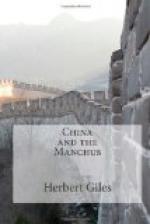Eight years later there was a revolution in Cochin-China. The king fled to China, and Ch`ien Lung promptly espoused his cause, sending an army to effect his restoration. This was no sooner accomplished than the chief Minister rebelled, and, rapidly attracting large numbers to his standard, succeeded in cutting off the retreat of the Chinese force. Ch`ien Lung then sent another army, whereupon the rebel Minister submitted, and humbled himself so completely that the Emperor appointed him to be king instead of the other. After this, the Annamese continued to forward tribute, but it was deemed advisable to cease from further interference with their government.
The next trouble was initiated by the Gurkhas, who, in 1790, raided Tibet. On being defeated and pursued by a Chinese army, they gave up all the booty taken, and entered into an agreement to pay tribute once every five years.
The year 1793 was remarkable for the arrival of an English embassy under Lord Macartney, who was received in audience by the Emperor at Jehol (= hot river), an Imperial summer residence lying about a hundred miles north of Peking, beyond the Great Wall. It had been built in 1780 after the model of the palace of the Panshen Erdeni at Tashilumbo, in Tibet, when that functionary, the spiritual ruler of Tibet, as opposed to the Dalai Lama, who is the secular ruler, proceeded to Peking to be present on the seventieth anniversary of Ch`ien Lung’s birthday. Two years later, the aged Emperor, who had, like his grandfather, completed his cycle of sixty years on the throne, abdicated in favour of his son, dying in retirement some four years after. These two monarchs, K`ang Hsi and Ch`ien Lung, were among the ablest, not only of Manchu rulers, but of any whose lot it has been to shape the destinies of China. Ch`ien Lung was an indefatigable administrator, a little too ready perhaps to plunge into costly military expeditions, and somewhat narrow in the policy he adopted towards the “outside barbarians” who came to trade at Canton and elsewhere, but otherwise a worthy rival of his grandfather’s fame as a sovereign and patron of letters. From the long list of works, mostly on a very extensive scale, produced under his supervision, may be mentioned the new and revised editions of the Thirteen Classics of Confucianism and of the Twenty-Four Dynastic Histories. In 1772 a search was instituted under Imperial orders for all literary works worthy of preservation, and high provincial officials vied with one another in forwarding rare and important works to Peking. The result was the great descriptive Catalogue of the Imperial Library, arranged under the four heads of Classics (Confucianism), History, Philosophy, and General Literature, in which all the facts known about each work are set forth, coupled with judicious critical remarks,—an achievement which has hardly a parallel in any literature in the world.




